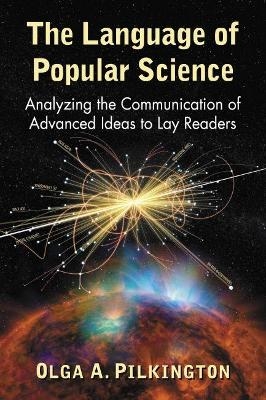
The Language of Popular Science
Analyzing the Communication of Advanced Ideas to Lay Readers
Seiten
2019
McFarland & Co Inc (Verlag)
978-1-4766-7253-3 (ISBN)
McFarland & Co Inc (Verlag)
978-1-4766-7253-3 (ISBN)
If you read popular science, you might wonder what makes these books work. The use of language is the key. Olga A. Pilkington uses linguistic analysis to show how expert popularizers use the narratives, definitions, and voices of scientists to engage readers, promote the scientific community, and demonstrate the power of science.
If you read popular science, you might wonder what makes these books work: how do the authors manage to make the subjects that used to induce sleep in class so entertaining and approachable? The use of language is the key. Olga A. Pilkington uses linguistic analysis to show how expert popularizers use the narratives, definitions, and voices of scientists to engage readers, promote the scientific community, and demonstrate the power of science. In the process, they often blur the lines between non-fiction and fiction, allow the reader to take part in thought experiments, and turn ordinary scientists into omnipotent heroes. Based on analysis of popular science bestsellers, this book offers a unique combination of linguistic scholarship and accessibility.
If you read popular science, you might wonder what makes these books work: how do the authors manage to make the subjects that used to induce sleep in class so entertaining and approachable? The use of language is the key. Olga A. Pilkington uses linguistic analysis to show how expert popularizers use the narratives, definitions, and voices of scientists to engage readers, promote the scientific community, and demonstrate the power of science. In the process, they often blur the lines between non-fiction and fiction, allow the reader to take part in thought experiments, and turn ordinary scientists into omnipotent heroes. Based on analysis of popular science bestsellers, this book offers a unique combination of linguistic scholarship and accessibility.
Olga A. Pilkington is an assistant professor of English at Dixie State University. She lives in St. George, Utah.
Table of Contents
Acknowledgments
Preface
Introduction: Popular Science
1. A Linguist Looks at Popular Science
2. Personal Narratives
3. Narratives of Discovery: Explanation Made Easy
4. Narratives and Ideology: What’s in a Structure?
5. What They Say: Speech of Scientists
6. What They Imagine Is Possible: Thoughts of Scientists
7. Literature and Limericks: Writing in Popular Science
8. Definitions: Types and Methods
9. Interacting with Readers through Definition
10. The Fictionalized Reader
11. Lab Lit: Fictional Science
Conclusion: Professional Science and Popular Science
Epilogue
Sources
Index
| Erscheinungsdatum | 16.03.2019 |
|---|---|
| Verlagsort | Jefferson, NC |
| Sprache | englisch |
| Maße | 152 x 229 mm |
| Themenwelt | Sachbuch/Ratgeber ► Natur / Technik |
| Geisteswissenschaften ► Sprach- / Literaturwissenschaft ► Sprachwissenschaft | |
| Sozialwissenschaften ► Kommunikation / Medien ► Allgemeines / Lexika | |
| Sozialwissenschaften ► Kommunikation / Medien ► Kommunikationswissenschaft | |
| ISBN-10 | 1-4766-7253-9 / 1476672539 |
| ISBN-13 | 978-1-4766-7253-3 / 9781476672533 |
| Zustand | Neuware |
| Haben Sie eine Frage zum Produkt? |
Mehr entdecken
aus dem Bereich
aus dem Bereich
Das umfassende Standardwerk auf der Grundlage der aktuellen amtlichen …
Buch | Hardcover (2024)
Duden (Cornelsen Verlag)
35,00 €


